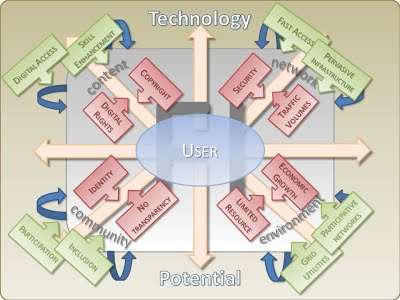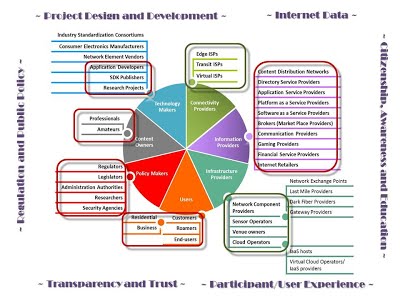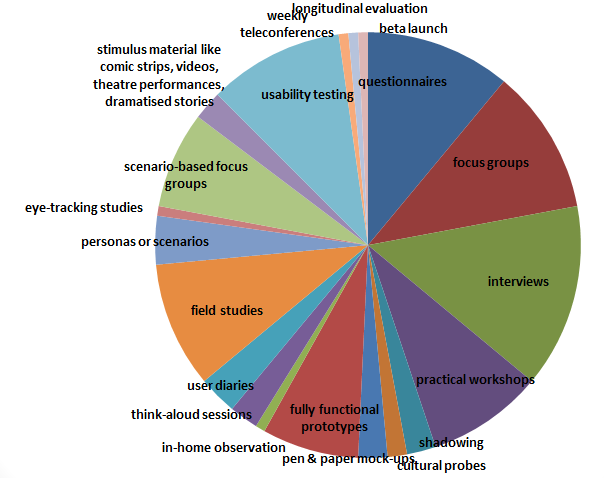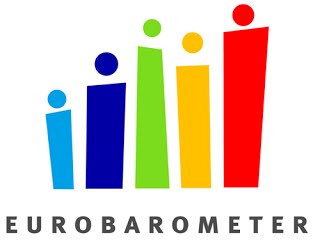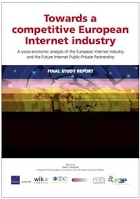Since its inception, the Internet has evolved from a purely technical artefact, in which all creators shared a common goal of interconnecting computers globally, toward a social phenomenon through a combination of uses and that evolution continues. The social and economic aspects that affect the Internet are as complex and interwoven the society and the economy itself. This complexity is based on the interdependence of disciplines that study changes in human nature, where economics, political science, humanities, psychology and law are linked to concepts like privacy, freedom of expression, intellectual property and social networks but also to topics like education, security, regulation, private life, communication, business, trust, intangible incentives, to name but a few. The “real world” users of the internet (i.e. consumers, citizens, students, politicians, scholars, artists, parents, etc.) constitute a powerful but also dynamic organism that has to be approached from a broad and holistic perspective. In this channel, we present the viewpoints of those who are studying the Future Internet. The aim is to provide access to wider social and economic challenges and trends so that discourse and debate on Future Internet research moves from a purely technological viewpoint to one that is balanced by real socio-economic needs. |
Studying the Future Internet
Eurobarometer report 2013: E-Communications Household Survey
For this year's edition, emphasis has been placed on consumer perceptions of broadband speed, on the quality of experience of access services, on consumer affordability, on factors for subscribing and switching between communication service providers and on the transparency of tariff information. More specifically, the main themes of the summary are: the different types of telephone access available to individuals and in the home, Internet access and its quality, penetration of communication service packages, consumer sensitivity to the speed of the Internet connection,the quality of experience of communication services, affordability of telephone and Internet services, the transparency of communication service pricing, factors in switching Internet service providers and service package providers and television access and means of reception. Below you can read an abridged summary of the key findings of the 2013 survey (the full report can be found here): Penetration rates of Electronic Communication Services in the European Union When broadband and narrowband access are combined, approximately seven out of ten EU households have home Internet access (68%). This proportion has increased by four percentage points since the 2012 report. The main reasons are lack of interest (65%), cost (19%), and that either the respondent or their household members did not know what the Internet was (7%). Consumer sensitivity to Internet connection speed The survey found that nearly six out of ten respondents (57%) did not know the maximum download speed of their Internet connection. Furthermore, nearly a quarter of the respondents who knew their download speed said that their actual Internet download and upload speeds did not match the terms of their contract. The price and technical features of the connection (maximum speed and download capacities) are the main selection criteria when subscribing to an Internet connection. Overall, slightly less than half of all respondents would be willing to change their Internet packages for higher speed or greater downloading capacity (45%), broken down as follows:
Quality of experience of communication access services Slightly less than three out of ten respondents had been blocked from accessing online content or applications either often or sometimes while using the Internet from home (29%). Furthermore, approximately four in ten respondents (43%) either sometimes or often experienced difficulties accessing online content and applications from home due to insufficient Internet speed or downloading capacity. On the other hand, the proportion of respondents who reported that access to online content or applications is sometimes blocked on their mobile phones has slightly increased to 20% from 16% in the previous report. Furthermore, around four in ten respondents thought their mobile Internet connection provider was responsible for blocking content (37%) and more than three in ten thought the application or content provider was responsible (32%). Approaching one in five respondents believed they were blocked from accessing content due to geographical copyright restrictions (17%) or by the manufacturer of their mobile phone (15%).
Affordability Over half of EU
citizens limit their national and international mobile phone calls because of concerns about cost (respectively 55% and
54%).
Price transparency and switching service package providers Slightly less than one third of EU citizens disagree that it is easy to compare the terms of service packages (29%), a 3-point increase since the 2012 Eurobarometer report. More than four in ten respondents reported that they have considered changing their bundle provider (42%), a nine percentage point increase since the previous survey (33%). |
Mobile communications market update
Addressing Future Internet Challenges
The Future Internet (FI) promises much if only in respect of the opportunity which might be available to exploit all the benefits of the Internet as it is now, but bigger, better, more secure and more efficient. As the technology develops, more and more potential is created. Bring users into the picture – as has been seen to be essential on many occasions in SESERV, not least the workshops in Oxford, Athens and Brussels, as well as the focus groups described in D2.2 and D3.2 – then there are benefits to them in various areas, such as access to and the generation of content; the potential to engage in ad hoc as well as existing on-line communities; but also to be able to learn about and effect the environment; all of which will ultimately have an effect on the network and infrastructures underlying all these activities. In each of these areas – content, community, the environment, and networks – as we move forward there will doubtless be risks and challenges that must be addressed (the red boxes in the figure), though at the same time there will be greater opportunities especially for inclusion and on-line presence (the green boxes). The challenges and opportunities are discussed more fully in D2.2. Here, let’s just summarise SESERV’s recommendations for a way forward. Having identified the main FI ecosystem stakeholders, the two SESERV co-ordination work packages engaged with most of them directly and in discussion (in the figure below, we are specifically interested in those outlined with red boxes. For more detail, see D2.2 and D3.2 ). In drawing together the discussions, not least from the focus groups, we came up with recommendations that fall into eight different categories:
We may summarise these recommendations within each area as follows, though they are dealt with in
context and in greater depth in D3.2 :
| ||||||||||||||||||||||||||||||||||||||||||||||||||||||||||||
Does your boss tweet?
More bosses should tweetRichard Branson recently nailed his colours to the mast very much in favour of social networks. From the CEO of the Virgin Group, it is perhaps no surprise that he claims to be an active participant in social media because it is important for his business. He recognises, though, that there is more to it: Embracing social media isn’t just a bit of fun, it is a vital way to communicate, keep your ear to the ground and improve your business. (loc cit) But employers don't play fair...Some people are a little sceptical about such an approach though, warning against potentially embarrassing posts to social network sites that are visible not only to friends, but to work colleagues and managers. There’s no doubt, though, that if used wisely social media can boost an applicant’s chances of success. 91% of employers review prospective employees via social networking sites, 76% using facebook, 53% twitter and 48% LinkedIn; 47% look on sites after receiving an application and before even talking to the candidate. A staggering 69% claim to have rejected a candidate on the basis of what they saw online (inappropriate photos, comments, behaviours and so forth); whilst almost the same number (68%) hired a candidate on the strength of the impression created (statistics from Reppler, which contains other useful statistics about on-line activity). A Study of CEO’sIn his LinkedIn post, Branson referred to a fairly extensive IBM study of CEO's and their attitudes to social networks. 1,709 CEO's and senior public sector leaders across 18 industries and 64 countries were contacted. In summary, the industry leaders agreed a set of three imperatives for ongoing success:
The push in IBM terms is about “leading through connections”; underlying it all, though, is participation, which – as outlined below – has both social and economic implications. And a socio-economic takeThrough the various workshops SESERV organised ( Oxford, Athens, Brussels) and the associated focus groups reported on in this year’s deliverables (D1.5, D2.2, and D3.2), we have highlighted the need for all of the FI stakeholders we have identified to be engaged: notwithstanding the knock-on effects for network operators, there is an increasing drive for participation: users are driving innovation, typically via non-PC devices, even around what would previously have been branded as having little cultural value. Over time, we have seen demonstrated:
|
How do FI projects engage users?
Source: SESERV User-Centricity Survey (29 of 55 total respondents reported using tools to engage with users). Chart created by Anne-Marie Oostveen. The SESERV project surveyed future internet projects, and asked them to identify the methods they used to understand their users and uses of the technology they are developing. As you can see in the above chart, while traditional methods such as questionnaires, focus groups, and interviews were mentioned by about 1/3 of respondents, a wide variety of other tools and techniques were also reported, ranging from user diaries, to eye-tracking studies, to stimuli including comic strips and theatre. The wide variety of techniques suggests that user-centric approaches to design are an important part of the FI ecosystem, but that no single technique dominates for doing so. It also suggests that there would be potential interest in workshops on methods for engaging users using some of the most innovative techniques. |
Eurobarometer report 2012: E-Communications Household Survey
For
this year's edition, an emphasis has been made on tariff transparency, quality
of services and consumer switching, in relation with the current policy debate
on net neutrality. Below you can read an abridged summary of the key findings of the survey (the full report can be found here): 82% of EU citizens who have broadband Internet access at home are unwilling to pay more for a faster Internet connection
Half of EU citizens are not aware that network operators and service providers may monitor the content they access (49%).
Two-thirds of households have Internet access (64%). Among households without an Internet connection, the top reason given for not having one is that all household members are disinterested in accessing the Internet (63%). These figures relay an increase of four percentage points since spring 2011. Cost, as an explanation, has decreased in importance, down to only 18%, compared with 21% in the previous survey. The changes in the reasons may reflect the more widespread levels of Internet access
Price is the most important factor when subscribing to the Internet. Nearly half noted cost as their first consideration (45%) followed by maximum download speed (13%), the fact that the Internet subscription is part of a bundle (12%) and the customer service offered (7%). No other factor was cited by more than 5% of respondents as their first consideration. Among those respondents who correctly stated the maximum download speed in their contract, two-thirds (67%) agreed that the speed matched the terms of their contracts. Four out of ten EU citizens experience difficulties accessing online content and applications due to insufficient speed or capacity (42%). However, only 8% claim that such difficulties are experienced often.
Slightly fewer than half of households buy bundled communications services (43%). The most commonly cited aspect of bundled services is the convenience of a single invoice (43%), followed by the perception that they are cheaper than paying for each service separately (31%).
Only a third of respondents have
considered changing Internet Service providers (33%) or bundle providers (33%). Most households (62%) have not
considered changing their Internet provider Telephone access is nearly universal (98%) among EU households.
Most mobile phone users limit their calls with their mobile phones because they are worried about communication charges (63%). |
Towards a Competitive European Internet Industry
The FI3P Project has now published it's final report analysing the economic and social impact of Future Internet technologies within Europe, as well as EU support for the Future Internet Public Private Partnership. The report aims to:
There's a useful executive summary and factsheet for those who want the elevator pitch. I could not help observing the final take away remark in the factsheet about the FI-PPP: Under ideal conditions, effects unleashed by the FI PPP could contribute up to €28 billion per year to the EU economy, corresponding to 0.24% of EU GDP, while the projected effects of the FI PPP+ could be even higher"Under ideal conditions" seems to be a key phrase and interesting optimistic headline. Digging more deeply you can find that the study made various model runs with different assumptions about the success of FI PPP. The headline GDP contribution is based on the assumption "....that FI-Ware and all use cases are completely successful". On p82 you will find the impact for FI-PPP should they be partially successful. Here two important conclusions are revealed. First,
the degree of success of the infrastructure activities (FI-Ware) and of the use cases
both determine the overall macroeconomic impact of FI PPP. Second, the size of the
GDP effect depends much more on the success of the use cases than on the success of
the infrastructure related activities. In numbers, if the Core Platform is not successful and all the use cases are the contribution to GDP will be €24 bn. This will no doubt be a significant point for debate |
Aleksandra Kuczerawy on Data Protection and the Future Internet
Aleksandra Kuczerawy, Legal Researcher at KU Leuven, will give a talk at the at the SESERV-organized workshop Socio-economic Certainties and Change for the Future Internet: Data protection and the legal frameworks to support it are an urgent concern of the Future Internet’s user base. Legal expert Aleksandra Kuczerawy tells us the critical areas to look out for, and how to prepare for the legal advances now developing.The workshop will take place in Brussels on June 20, 2012, right before the Digital Agenda Assembly. Participation is open and free-of-charge. Take the opportunity and register on-line. On the SpeakerAleksandra is a legal researcher in the Interdisciplinary Research Center for Law and ICT (ICRI) at the Katholieke Universiteit Leuven. She joined ICRI in November 2007. She was a part of the study team conducting the independent study on indicators for media pluralism in the European member states, commissioned by the European Commission (DG INFSO). She also conducted research in the area of Spatial Data Infrustructures (SDI) while working on access and licensing protocols in the eContentplus OneGeology Europe project. Currently she conducts research in the field of privacy and identity management in new technologies. She works on the European Project PrimeLife (Privacy and Identity Management in Europe for Life). Lately she has expanded her research field to legal aspects of User Generated Content (UGC) in the European Project SocIoS (Exploiting Social Networks for Building the Future Internet of Services) where she is working on privacy aspects as well as liability of Internet Intermediaries. Moreover, Aleksandra is an assistent editor of the International Ecyclopeadia of Law (IEL) - Cyber Law. |
Keynote Announcement: Stephen Minton (IDC)
Stephen Minton, Vice President for the IDC Worldwide IT Markets, will give a keynote speech at the SESERV-organized workshop Socio-economic Certainties and Change for the Future Internet: IDC looks at the growing market segments of the Future Internet, and how the social and economic context of its “Information Society Index” applies to its industry stakeholders. The analysis and forecast will set a context for much of the discussion throughout the day.On the SpeakerStephen Minton is a Vice President and analyst at IDC covering global ICT markets. He manages IDC’s industry-standard Worldwide Black Book research, which tracks ICT spending in 54 countries. In this role, he co-ordinates IDC’s global IT spending research and analysis, helping IT organisations around the world with their planning, resource allocation and competitive analysis initiatives. Additionally, he is responsible for the IDC Information Society Index, which benchmarks countries according to IT and Internet socio-economic impact and penetration. Stephen is the author of papers which focus on globalisation and the spread of technology into emerging markets, and is a regular speaker at major international events and conferences on the subject of macro-level ICT trends. In 2002, he addressed the United Nations in New York, speaking to UN ambassadors on the subject of the Information Society. He is regularly quoted for his views on ICT market trends by major media publications, and has featured on CNBC and Bloomberg television. Stephen previously worked with Digital Equipment Corporation (DEC) in a marketing role. Originally from Hartlepool in the North of England, he graduated from the University of Salford in 1995. He has also worked in the field of consumer market research with Millward Brown International. He moved from IDC’s UK office to the United States in 2001, where he spent ten years in Massachusetts before returning to the UK in 2011. He currently lives with his wife and two daughters in Hartlepool, England. |
Internet Science Summer School 2012
The Network of Excellence Internet Science is currently inviting applications from early career researchers for the first Summer School to be held in Oxford from 12-18 August 2012. The theme of the summer school is "Internet Privacy and Identity, Trust and Reputation Mechanisms," with sub-themes addressing online identity and ACTA/SOPA/CISPA. Academic ProgrammeThe principal aim of the programme is to promote interdisciplinary discussion of issues related to Internet Science among early career researchers (advanced PhD students and those in the first four years of their research career) engaged in research related to Internet privacy and identity, trust and reputation mechanisms. Daily activities will be structured around morning lectures and afternoon discussions aimed at developing participants’ thinking on a range of issues central to the Internet. Participants will have the opportunity to discuss their research with faculty and other early career researchers. A range of social events will provide informal opportunities for continued discussions and networking among participants. The summer school will draw upon the strengths of the Network of Excellence in Internet Science (described below) and will involve participation of many of its members, in addition to colleagues from partner institutions. Benefits of participationParticipants will meet and work with a diverse group of their peers, a considerable benefit for researchers who may not have large academic peer groups in their own departments. Additionally, participants will:
Research areasWe welcome applications from early career researchers in any discipline whose work in the field of Internet research engages with the theme of the summer school and reflects the disciplinary base of the Network of Excellence in Internet Science, as described below. About the Network of Excellence in Internet ScienceThe Network of Excellence in Internet Science aims to develop an integrated and interdisciplinary scientific understanding of Internet networks and their co-evolution with society. The network is composed of over thirty research institutions across Europe from a variety of disciplines including physics, sociology, game theory, economics, political sciences, network engineering, computation, complexity, networking, security, mathematics, humanities, and law, as well as other relevant social and life sciences. Its main objective is to enable an open and productive dialogue between all disciplines that study Internet systems from any technological or humanistic perspective, and which in turn are being transformed by continuous advances in Internet functionality. Fees and activitiesDelegate fees are £900 and this includes 7 nights’ en suite accommodation at Queen’s College, daily breakfast, lunch (including one BBQ) and refreshments, and two evening college dinners. Summer school participants will have an opportunity to take part in Oxford social activities. Applications must be submitted by 5p.m. (GMT) on Friday, June 1st. We will notify successful applicants by Friday, June 15. Please contact Tim Davies for further information. |



